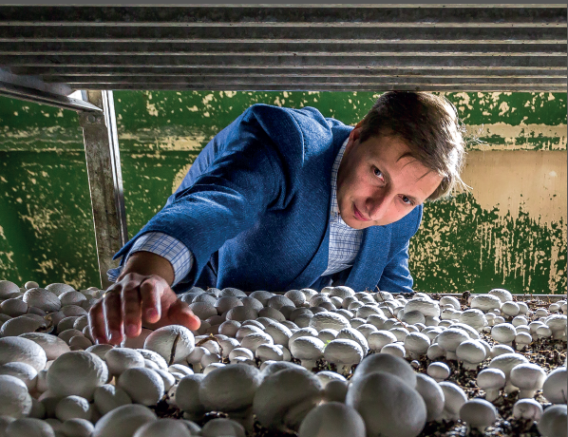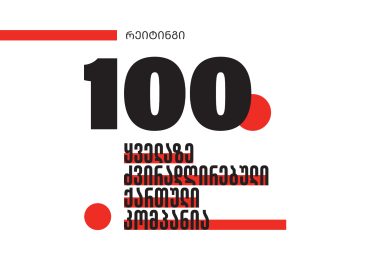In six years, the Tetri Kudi Company, headed by Ivane Ioseliani, increased its productivity six times, and captured 80% of the market, putting Georgia on the list of exporter countries, where alongside mushrooms, a whole new agricultural potential has been cultivated.
When I came here, it looked like the aftermath of the Battle of Stalingrad. Although mushrooms had been cultivated here since the Soviet period, much of it got looted in the 1990s,” recalls Ivane Ioseliani, while pointing to the buildings that make up the company’s industrial complex, which is spread over 14-hectares of land.
Up to forty modern greenhouses have sprung-up like mushrooms on this vast territory. Tetri Kudi, situated on the 17 kilometer of the Rustavi Highway, cultivates champignons, oyster and Portobello mushrooms, and represents Georgian agriculture’s huge potential on the international market. If anything reminds me of Stalingrad here, it’s the continuous buzzing and humming of compost machinery, conveyer belts and bunker fillers. For Ioseliani, this droning sound reverberates just like the symphony of a famous German composer. As the CEO and conductor of an orchestra comprised of 200 employees, he has to make sure the music flows without interruption. Cultivating and harvesting mushrooms is a complex process, where each step overflows into the next. Therefore, each member has to flawlessly play their own chords – one false note, and the harmony will be disrupted. For such a faultless performance, their concert deserves applause.
Just six years ago, 300,000 mushrooms were consumed in Georgia, out of which, more than 250,000 of them were imported – half of them came from Turkey, and the other remaining half from Azerbaijan and Armenia. In the offseason, on the last week of December, mushrooms were transported from Iran too. In the end, consumers had to pay three-times the market price for a kilo of mushrooms.
In 2012, the year that Ioseliani joined the company, Tetri Kudi had only been operating for two years, and 70% of the company’s sales were to wholesale clients. However, the founders were optimistic that they could grow and harvest up to 40,000 mushrooms per month. What followed was even better. In less than four years, Tetri Kudi became a flagship company in the mushroom farming industry, exceeding the founders’ optimistic goals by five times that number. Nowadays, the company’s number of employees has doubled, and Tetri Kudi harvests not 40,000, but 200,000 mushrooms per month, and mainly supplies the primary consumer market, leaving some 10% to wholesale. The company also supplies more than 3,000 retailers across the country, whereas in 2010, this number was only three or four.
There is hardly any need for import, as the company can handle 80% of the Georgian market. The company’s export numbers are also rising. In fact, Tetri Kudi already ships mushrooms to Armenia, UAE, and Russia, and plans to expand their export to Qatar as well. As a result of switching to local production and eliminating import costs, the price for consumers has dropped drastically. This is a win-win for all parties involved.
Why such a marked turn of events? “In the past, the company just wasn’t as ambitious as it is today,” remarked Ioseliani with a shrug of his shoulders.
However, to go with the company’s increased ambitions, there are also the increased challenges in an already challenging mushroom industry. This is not due to the scarcity of mushrooms or because of slow production, but rather the perishable character of the product itself. The lifespan of a mushroom is generally about 10 days, which reduces the sales period. “When someone buys mushrooms, they can keep them in the refrigerator for 3 to 5 days, and prepare a meal afterwards. However, while on the store shelves, it’s paramount that the mushrooms look fresh,” notes Ioseliani. “Because as soon as the mushrooms change color, they lose their attractiveness in the eyes of consumers,” he adds.
Ioseliani says that this presents a challenge for distribution, because the whole supply chain has to work like a clock, and the company must ensure that fresh products are delivered from Rustavi to distant cities and villages in just a day. Any natural calamities or even a delayed flight can potentially harm the operation, and cost the company dearly. There are many external factors that influence the flow of products. Everything is important, starting from religious rites, such as the fasting period, to the dynamics of aerial services in the country. Georgia is still one of the more expensive countries in terms of airfreight – airport, security and terminal services are still relatively high.
“Transporting a kilo of mushrooms from Amsterdam to Dubai costs 25 Euro cents, while from Georgia to Dubai the price is six times higher, around 1.50 Euros,” says Ioseliani.
That being said, if Ioseliani were worried about these challenges, he would not have gotten involved with Tetri Kudi in the first place. Back in 2011, in identifying the market’s obstacles, one did not need to conduct a deep analysis of the industry. One example would be public attitude towards mushrooms during that period. This required the brand to build consumer trust – not from ground zero – but from a negative position. Such an attitude complicated relations with retailers. They simply did not believe that it was possible to sell large quantities of mushrooms, and refused to put the product on the shelves.
“The most interesting case was when we decided to sell pre-cut mushrooms – these were very successful on the Dutch market,” recalls Ioseliani. The cap of a ripe mushroom is completely open, which may alarm the consumer. So the company began negotiations regarding the sale of pre-cut mushrooms with retail networks.
“It was ridiculous for everyone. They were teaching us about the distrust of Georgian consumers,” explains Ioseliani. “Only Carrefour agreed to sell the pre-cut mushrooms as an experiment in one of their shops – and only for a short time,” he laments. Nowadays, Tetri Kudi sells around a half-ton of pre-cut mushrooms in various retail networks.
Aside from the distribution network, the company has increased its assortment of products too. “In 2012, when we harvested two tons of oyster mushrooms, the sales department went crazy they didn’t know where and how to sell so many mushrooms,” says Ioseliani. Today the company produces 30 to 40 tons of oyster mushrooms per month, and that is only 25% of the company’s total production.
In a greenhouse micro-climate, and a highly-regulated production cycle, the workers, dressed in sterile uniforms, tensely keep an eye on the time.
“If we don’t finish in two minutes, we’ll lose several tons of champignon,” cautions Ioseliani, while walking me towards the other greenhouses. He elucidates about the 63-day cultivation process, which includes composting, pasteurization, seeding, the growing of mycelium, hoeing, molding, watering and harvesting. He also touches upon the major risks and challenges of this process, which can only be neutralized by carefully controlling the humidity and temperature, the purification of air-conditioning systems, and thoroughly following sanitary and hygienic norms. Every sentence that comes out of Ioseliani’s mouth, is saturated with technical terminology. The more passionate the explanations, the less I understand the meaning of those terms. As soon as he notices my hardship, he concisely summarizes: “In short, we’re tricking mushrooms, as if autumn had come, and it has rained. They start growing. Humidity, temperature, oxygen and the level of CO2 are just four out of the 17 factors we need to control and adjust in the process.”
Yes, he is a manager and not a botanist. But with an ability to sketch a bigger picture, with his baritone voice, and calm, almost unemotional, but at the same time impressive manner of speaking, this young CEO radiates self-confidence. Five years ago, he had no experience in the sale of agricultural products, but he managed to make his decisions equally respectable, both for the founders of Tetri Kudi, as well as for its employees. Ivane Ioseliani serves as an impeccable example, that a good manager is the key to success in every industry. Taking into account his choice, it becomes clear what type of manager he is —for Ioseliani, there is no such thing as doing the “right business”. Instead, he prefers doing all business right.
From 2007-2012, prior to taking on the role of CEO at Tetri Kudi, Ioseliani held positions in business sectors far removed from agricultural production. First he was the Commercial Director at the Georgian Industrial Group, then he assumed the role of Deputy Director at Sakinvest, and afterwards, Tiflis City. So this begs the question: why mushrooms?
“Partially it was intuition, and partially it was trust I had in myself. I sensed huge potential for very fast growth,” Ioseliani reveals.
From the very moment he began his new position at Tetri Kudi, Ioseliani altered the structure of the administration by widening the spectrum of decision-making in middle management, which is quite atypical for Georgian companies.
“Rights come with corresponding responsibilities,” he explains. “For me it is important for an employee to be smart and be able to make their own decisions in non-standard situations. This happens pretty often in our business,” he notes.
Under the leadership of Ioseliani, the company rapidly began to implement Western standards (a mere formality is left until the company acquires the Global Gap and ISO 22000 certifications, which will make Tetri Kudi the only company in the region with those standards in the field of agriculture).
The automation of production and the implementation of Western standards was only part of the larger effort. According to Ioseliani, the biggest challenge for the company was in the sales division. “Any production builds upon short, mid, and long-term sales planning,” he says. Ioseliani explains that the main breakthrough for Tetri Kudi (and for fresh mushrooms to appear on our tables) was distribution. At Tetri Kudi, the Distribution Department is divided into four segments – HORECA, regions, retail and wholesale. The company has also built a sophisticated structure for the delivery of products to retailers. How rapidly suppliers deliver mushrooms throughout their network is of the utmost importance. To insure the weaker links in the chain from product to end-consumer, the company has to control around 3,000 sales points every day.
“It is very important to pay attention to how the product is displayed in the shops. During some periods, we might even be losing by working on certain segments. However, in the long run, this is beneficial, as it popularizes the product and develops consumer habits,” notes Ioseliani. “For this very reason, we decided to develop our own system of distribution. Our distribution process is unique. No other company has done anything like this, not only in the cultivation of mushrooms, but in other domains of agriculture as well. Yet, we are aiming to go even further,” he says.
Tetri Kudi’s successful business model has the trust of Georgian and foreign financial institutions. In the last four years, the company managed to attract over $11 million in investment capital. The largest portion of this capital was received from its American and Armenian founders, while the rest came through credits obtained from the European Bank for Reconstruction and Development (EBRD), the World Bank’s International Financial Corporation (IFC), and national investment programs such as “Produce in Georgia” and reduced interest-rate agricultural loans. Investors, clearly seeing the company’s positive dynamic in every direction, feed profits back into the company’s development.
The last million that Tetri Kudi received is being spent on developing the company’s own composting agriculture, which will create jobs for up to 40 more employees. The construction of the Dutch-style composting system has already begun, the only impediment has been the bureaucracy that prevents foreign investors from registering acquired land. Initially, the investment was intended to widen production, but instabilities on the currency market have resulted in an increase in price of imported raw materials. For example, the company was importing around 8,000 tons of champignon compost amounting to $10 million over five years. Besides compost, peat was also imported. Several months ago, the company acquired the license for processing a quarry in the Dmanisi district. As a result, by May of this year, the company will be able to produce mushrooms from local raw materials. One exception will be mushroom spores, which are insignificant in the prime cost price.
Locally-produced compost is helpful for Georgian farmers as well. “Three years ago, I faced difficulty when I tried acquiring wheat straw in Georgia. Farmers preferred to burn rather than sell it. There was a widespread belief that organic waste should be burned or left in the ground, since this was something done throughout generations,” explains Ioseliani. “Now we have acquired a huge amount of it, and as a result, through the sale of this organic waste, farmers are making a profit.”
Five years ago, finding raw materials with standard quality and delivery was impossible. However, with the development of mushroom cultivation in Tetri Kudi, the production of raw agricultural materials has also taken root.
Two years ago, a column published in Forbes, where British author William Dunbar referred to Georgian cuisine as unvarying, was met with harsh criticism. In a real pique, the nameless heroes of the Georgian gastronomic vanguard devoured the “silly foreigner” and bashed him on the pages of the yellow press.
I hope, the same will not follow this time, but sometimes it is truly better to be open about pitfalls. We can praise Georgian culinary traditions to our heart’s content, but the facts speak for themselves: in comparison to European and other south Caucasian countries, Georgia has a poorer culinary tradition with regard to using mushrooms. Both, Azerbaijan and Armenia have a higher per capita consumption of mushrooms than Georgia. The proportion of difference is quite impressive. The average per capita consumption of mushrooms in Georgia is around 0.5 kg., while in Italy it is five times higher at 2.6 kg per capita, and in Germany almost four times higher – 1.8 kg. For Tetri Kudi, this has both negative and positive ramifications.
As far as the downside, Georgian mushroom export to the EU is more science fiction than it is reality. European producers of mushrooms have reached an economy of scale about a half a century ago. Producers there are working at a very low margin, and their wholesale price is much lower than Georgia’s (Poland alone is producing 1,000 times more mushrooms per year).
“Our production might be considered the largest in our region, but for Europe, it’s just a mid-sized production,” says Ioseliani. “Their production is much more diversified, and their production cycles work without almost any residue. We are also moving in the same direction but need more time.”
Then there are the good aspects. There is potential for three to four-fold growth of the local market in Georgia, which will make Tetri Kudi more competitive in the region. This includes Turkey, Azerbaijan, Qatar, as well as, Armenia, UAE and Russia. As far as the Russian market, Tetri Kudi is not pushing forward quickly, as it prefers stable markets.
To achieve this goal, Ioseliani morphed into a genuine mushroom missionary. Periodically, he has even lowered the price of mushrooms below its net cost in order to overcome the myth of the “dead season”, as if mushrooms should only be consumed during religious fasting periods. “We worked intensely on diversifying the menu, and aside from a few traditional dishes, like mushrooms on an earthenware frying pan and stewed mushrooms, we popularized our products to be used in many different meals,” says the CEO. In some restaurants, he says, they offer salads with raw champignons, which would have been unthinkable only five years ago.
The marketing is working.
“Sometimes, during the holidays, restaurants offer new meals with mushrooms for degustation for free. Otherwise, clients would probably never order the meals they are not familiar with,” he explains.
When treading in unknown territory, a prudent manager prefers taking careful but firm steps.
“We do not have the official statistics, but according to rough estimates, 60% of Georgian exporters lose their market within a year. Why do you think this happens?” asks Ioseliani rhetorically. “When entering a market, a competitive producer or importer has to a) lower the price, b) improve the quality, and c) find alternative administrative or commercial resources in order to win-back the lost niche. Most importantly, Georgian producers tend to think more about entering the market than they do about retaining it,” he says.
Concerning the production itself, Ivane Ioseliani does not reveal his specific plans, but expresses desire for further diversification. “We would like to repeat everything exactly the same: find an available niche, halt imports, and develop local production and the potential for export.”
Hopefully, the company’s agricultural production will cultivate like mushrooms. If this happens, we will be in good hands. It will benefit everyone – the company, the country and our diets.

















